Gordon Myers
Articles on Life, Truth, Love, Computers, and Music
Why are they arguing?
The following post intersperses verses from the Bible account of Bartimaeus, from the 10th chapter of Mark, with my own interpretation of what might have been going through Bartimaeus' head at the time. Bible verses are italicized and presented in a serif font, with a summary at the end after the picture.
As he went out of Jericho with his disciples and a great number of people, blind Bartimaeus, the son of Timaeus, sat by the highway side begging.
I've been sitting here my whole life. What's going to happen today? The same thing that happens every day. People will walk by with their smug looks and feigned sympathy. I'm sick of this. Why did I have to be born this way?
And when he heard that it was Jesus of Nazareth, he began to cry out, and say, Jesus, thou son of David, have mercy on me.
Jesus... I've heard of him! This is my chance! They say he can heal the blind. They say he gives hope to widows. They say he can resurrect the dead. I need to get closer. Jesus, help!
And many charged him that he should hold his peace: but he cried the more a great deal, Thou son of David, have mercy on me.
Wait... what? Why are they arguing against me? These same people who walk by to the temple and look down on me and pretend to wish me well. Why don't they realize that this is what I need? Can they really not see how obtuse they're being? You know what, they have never done anything for me. I need to get closer to Jesus. I don't care what they say. This is my chance. Jesus, please hear me!
And Jesus stood still, and commanded him to be called. And they call the blind man, saying unto him, Be of good comfort, rise; he calleth thee.
He called me. He called me!
And he, casting away his garment, rose, and came to Jesus.
I am done with this life. I am done with this begging, this blindness, this exile within my own body. I am done with it. I am standing up to it and casting it aside once and for all.
And Jesus answered and said unto him, What wilt thou that I should do unto thee? The blind man said unto him, Lord, that I might receive my sight.
Wow. I've never felt a love like this before. That word doesn't even do it justice. I have never felt what I'm feeling now. But his question: what will you do to me? Isn't it obvious? Can't he see who I am? Can't he see what a wretch I am? I want you to heal that, Jesus!
And Jesus said unto him, Go thy way; thy faith hath made thee whole. And immediately he received his sight, and followed Jesus in the way.
Wait, he really couldn't see it. I'm not a wretch. I'm not hopeless. He couldn't see it because it's gone. I can see. This is who I've always been. Wow! I feel on fire! I can see! This is what I've always been looking for! I cannot contain or describe this joy I'm feeling! From now on I want to share this with everyone I meet. I have to share this with everyone I meet. He really does heal the blind. I can see! Praise God!

The part that always stands out to me the most in this story is the response by all the other bystanders when Bartimaeus first starts to reach out for Christ. They inexplicably resist his efforts. The question I'm always left with is the question I presented above: Why are they arguing against me? When someone is reaching out for geunine healing, what would you voice to them? Are you one of the voices in the crowd telling them "that's impossible" and essentially "get back in place"? The only explanation I have for why anyone would make these arguments is because they don't realize what they're saying. People get too self-absorbed to recognize what it is they're really communicating to others, otherwise they wouldn't say such things.
It also stems from the belief that people are made up of nothing but matter, and the consequent belief that either God, too, is somehow material, or that He doesn't exist at all. When we think of others as diagnoses, as matter bodies made up of certain proportions, proclivities, and of a certain age, those thoughts limit ourselves and others. And that way of thinking tends to discouarge others from breaking free of those limits. I think this statement by Mary Baker Eddy explains this well:
The belief that God lives in matter is pantheistic. The error, which says that Soul is in body, Mind is in matter, and good is in evil, must unsay it and cease from such utterances; else God will continue to be hidden from humanity, and mortals will sin without knowing that they are sinning, will lean on matter instead of Spirit, stumble with lameness, drop with drunkenness, consume with disease, -- all because of their blindness, their false sense concerning God and man.
The story above highlights Bartimaeus' encounter with the Christ. And it's good to realize that a genuine encounter with Christ is not something that can be faked. It's not something that can be induced by drugs or created through will-power. It's not dependent on ones attendance in church or having the right Sunday School teacher. An encounter with Christ is individual and unmistakeable. It requires both the receptivity of a humble beggar and the willingness to stand up for oneself, acknowledging that one is worthy and that there is hope.
You never know what the people around you may be going through. So today, I encourage you to watch what you say. Don't get caught up in the kind of subtle arguments that effectively tell Bartimaeus to sit back down. Don't think of people as material labels. Don't be a discouraging bystander with a narrow view of reality. See people as spiritual beings, never a mistake, never broken, never less-than. Acknowledge that each person you encounter has a unique purpose only they can fulfill. And that includes you! Be the voice of encouragement, and if you see someone reaching out for Christ, for heaven's sake, don't get in their way!
Shameless persistence
Tonight my cat reminded me of a Bible story that I love, from Luke 11:
Suppose you went to a friend's house at midnight, wanting to borrow three loaves of bread. You say to him, "A friend of mine has just arrived for a visit, and I have nothing for him to eat." And suppose he calls out from his bedroom, "Don't bother me. The door is locked for the night, and my family and I are all in bed. I can't help you." But I tell you this -- though he won't do it for friendship's sake, if you keep knocking long enough, he will get up and give you whatever you need because of your shameless persistence. And so I tell you, keep on asking, and you will receive what you ask for. Keep on seeking, and you will find. Keep on knocking, and the door will be opened to you.
That's the NLT; the KJV uses the word importunity instead of shameless persistence. But you get the idea. Now back to my cat.
She loves going outside. Outside is the most incredible, magical, wonderful, amazing place in the whole wide world to her. She is not an outdoor cat, you see, but I occassionally let her out into the backyard if I'm there to supervise her (because I'd rather not have her run away or get eaten by turkey vultures!).
She spends most of her life inside, and she spends a lot of that life relentlessly meowing at me, asking to be let outside. Of course, I'm a busy guy, so often I simply ignore her wails.
And tonight, I ignored her as I often do. I have a lot of things to work on tonight, so I told her that she'd have to wait until tomorrow. But something was noticeably different tonight. Her meows were louder and more frequent. They sounded almost pained; you could hear the desperation in them. And as she kept that up, I had a change of heart. I decided I'd make a little time in my schedule to play with the cat outside. She was very happy about this.

Maybe you've wanted something for a long time that doesn't seem to be happening; you've wanted it badly. Maybe you've even consciously prayed about it, but nothing seems to be moving. I like Jesus' short parable, because it reassures us that we we will get what we need as we keep asking. I had ignored my cat's pleas, but as she kept asking, it touched me. I wanted to change my own schedule to accomodate her better. And if just the simple cry of a cat can implore a man to do that, imagine how much more of an effect your prayers -- the prayers of a beloved son/daughter of God -- can have with your Heavenly Father.
Now, I don't think the analogy is perfect, so don't try to dissect it too much. I don't think God is actively ignoring you because He's too busy making spaghetti, for instance, and that your prayers will change His schedule. Not at all. In fact, I'm quite sure God is always listening and unfolding things just when you're ready for them.
I think the moral of this story is less about the final effect, and more about your approach. Being "shamelessly persistent" is a quality sometimes looked down upon. People who are "shamelessly persistent" might be labeled as "someone who won't take 'no' for answer." And certainly, there is a line to be drawn with obsession. But to me, the reason Jesus praises the value of importunity is because it means that you're starting to believe that you deserve the things you're asking for -- that you haven't been disqualified or excluded from goodness. And you believe it enough to keep asking for it, despite opposition.
Earlier this evening, my cat's need was to go into the backyard. She kept asking, and she got what she was asking for. If the cat can do it, so can you.
Remembering the good
In the 17th chapter of Luke, there's a little known story about Jesus called the Cleansing of Ten Lepers. It was typical back then that anyone with a skin aberration was excluded from taking part in temple rituals and daily life with the community. But once those impurities healed (if they did), the person was supposed to present theirself to a priest who could give them the all-clear. The priests at the time received their equivalent of medical training, which enabled them to examine all sorts of skin conditions to detect what was contagious and what was benign. But leprosy was the worst-of-the-worst. Leprosy was considered incurable, so contracting it meant exile.
What Jesus has to say to the ten lepers in the story is interesting. Without hesitation, he commands them, saying, "go and show yourselves to the priests." This command only makes sense for people who don't have leprosy. I believe Jesus totally saw past the leprosy -- he refused to see the leprosy -- and instead saw nothing but the reflection of the Almighty in each of them. Jesus saw beyond the surface appearance and deep into the real, spiritual substance of who they were and Who created them. This reminds me of the following statement, by Mary Baker Eddy:
Jesus beheld in Science the perfect man, who appeared to him where sinning mortal man appears to mortals. In this perfect man the Saviour saw God's own likeness, and this correct view of man healed the sick.
Then, as the men walked on their way, they were cleansed -- the leprosy simply stopped existing. It miraculously disappeared from each of their experiences. And at that point, as the Bible describes, one of these ten stopped, turned around, and thanked God profusely before continuing on to the priest. Only one. The other nine just kept walking as if nothing out of the ordinary had occurred.
I confess that the latter part of the story has always baffled me the most. Why wouldn't all of them be singing in the streets, leaping and dancing for joy? If you had been burdened with a horrible, incurable skin disease that left you excluded from society and from basic human rights, and then someone healed you of that, how could anyone NOT be overflowing with thankfulness? Could those nine men really have been that aloof and ungrateful?
Thinking about this story, I turned that question on myself -- which in general is a practice I'd always recommend. How many victories in my own life have I completely glossed over as if nothing special has happened? How many times have I written off the divine to stay focused on the task at hand? It's true that I can't claim anything quite as fantastic as an instantaneous healing of leprosy in my own life. But how many other lesser battles that I've triumphed over have I failed to give thanks for, or even acknowledge at all?
I have had some breakthrough moments that, to me, unequivocally reassure me that God cares for me and is operative in my life. But when all the persistent, nagging, unresolved issues seem to pile up during the week, how easy it is to forget those blessings. I think there's a message in this story about taking time out of the day, on a consistent basis, to thank God for the good in our lives. We should thank Him for everything good, big or small. Whether it's a breakthrough epiphany or just the smile of a friend, goodness, by definition, comes from God. So don't forget to stop and give thanks before getting swept up in the busyness of daily life. It's worth it!

Programming is like salsa dancing, for better or worse
My last post was about programming, and this one will be too. Although the last one was a "how to" post, whereas this will be philosophical musings on the merits of programming languages. So with that said, let me tell you that I hate Java. (I'm not referring to coffee, as my hatred of that flavor is merely incidental.) But Java, as a programming language, is dreadful. Why? Because of something that has nothing to do with the actual language at all.
I will posit to you that all modern programming languages (worth discussing in terms of business applications) are basically the same. Any major programming language worth its salt is going to have things like exception handling, regular expressions, loop structures, object orientation, etc. Each one will naturally have different syntax and their own unique quirks, but it all comes out in the wash. If you've been programming for any amount of time, you probably won't have too much difficulty jumping from one major language to another.
What really sets languages apart, then, is how easy they are to pick up when you don't know what you're doing. There are three facets to this. Easy to pick up languages should have (1) as little boilerplate as possible, (2) a low probability of causing fatal errors, and (3) good documentation. Java fails miserably on all three counts. Java is riddled with meaningless and cryptic boilerplate. And unless you type everything exactly right the first time, your Java program will not compile. You'll very likely be given some obscure red error message.
And on documentation -- perhaps I'm just spoiled as a PHP developer, because PHP, hands down, has the best documentation out there of any language. The PHP manual is pretty, it's full of helpful and real-world examples, and the user comments are renowned for their usefulness. Sure, every once in awhile you'll get a bad egg in there, but overall, PHP's user comments are so highly regarded that you can actually download an official copy of the manual with user comments included.
Java, on the other hand, has miserable documentation. It's not as though things go undocumented in the Java world. On the contrary -- every single class, method, and property in Java is documented, and that documentation is verbose. But those documents say nothing. Their length is downright deceiving, as it's often some of the most obscure language you'll ever run into. And don't expect to find any use case examples or user comments.

Now here's the analogy you've all been waiting for. I've taken salsa dance classes a couple of times over the years. I'm not exceptional at it, but the classes are fun. But I've learned the hard way that what you learn in the classroom is very different from actually going to a club and dancing real salsa with strangers. I had a bad experience with that last year; a friend (who is a girl) needed someone to go with her to a salsa dance downtown. It might be the bitterness talking here, but I think girls have a very different experience going to dances than guys do -- particularly guys who aren't great dancers and only have a lukewarm interest in it. More on that in a moment.
Looking at all the other dancers there was intimidating. I quickly realized just how little the classroom had taught me. Add to that my natural resistance to talking to strangers / fear of rejection, and the scene seemed downright hellish.
I was able to approach one girl who seemed closer to my own lack of expertise, and she was graciously willing to lend herself to me for one dance. But it became quite clear, less than halfway through the song, that I had run out of moves and didn't really know what I was doing. So after the song ended, she politely moved on to the more experienced dancers who were ready and willing to lead her, spin her, and dazzle her. That process taught me literally nothing -- besides the striking realization that I am not a talented salsa dancer. It was pretty discouraging and left me with little desire to ever go back (at least until I miraculously transform into a great, confident dancer with an endless repertoire of moves).
From what I've seen, experimenting with Java programming is a lot like that. If you aren't already an exceptionally talented and attractive programmer, no one's going to help you. The documentation sure won't. Or even if you do "get a dance" (i.e. you get some very simple piece of code to compile), you probably won't learn very much from it, and you certainly won't be made to feel very welcome. The learning curve is just too damn intense.
Whereas, my friend's perspective of going to a salsa dance club (as a girl) is probably a lot more akin to trying out PHP programming. In that case, all sorts of guys will probably come up to you, ask you to dance, and lead you on exactly how you should move. As long as you understand the basics, you'll do fine. That's PHP's documentation, in a nutshell. And if you make a mistake on the dance floor (or in your code), people will probably just laugh it off and tell you you're great anyway (or, your program will still run and the output will still be pretty close to what you're expecting).
Different programming languages fulfill different niches, some compete more directly with each other than others, and every language has its quirks. But at the end of the day, what really matters is how easy it is for newcomers to get on-board. In that regard, PHP does exceptionally well, while Java crashes and burns and dies a hundred fiery deaths.
Java is a discouraging language, mainly because of its poor documentation. I think most programming languages would be benefited by having the humility to admit just how much of a better job PHP does when it comes to documentation, and if they learned to model their own off of that. Languages borrow from each other all the time. And if languages like Java could start to borrow that from PHP, everyone would win.
Agree? Disagree? I'd love to hear from you in the comments. And if you'd like to read more on why PHP is actually pretty great, check out this article by Nikita Popov.
How to Sign a Java Applet
I am not a Java developer. I'm a PHP developer who happens to have written a Java applet in NetBeans. (Apparently it's not technically an applet, but a "Web Start application;" I don't know what the difference is and I don't care.) For a long time my applet was "self-signed," until Java changed their policy last year, no longer allowing self-signed applications after a certain cutoff date. That meant I started seeing nasty warnings like this:
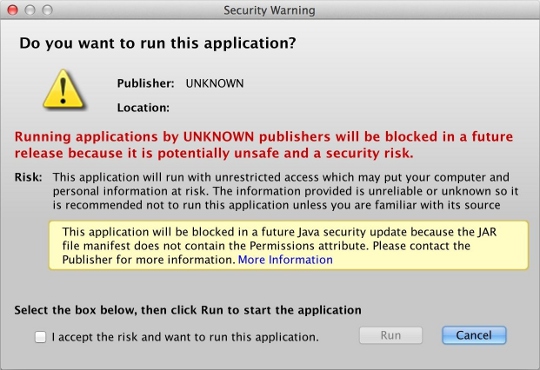
...which eventually changed into this:
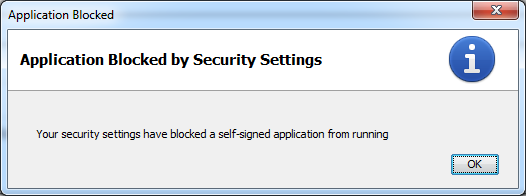
So I had to purchase a Code Signing certificate from some signing authority like GoDaddy or Thawte or Comodo. I went with GoDaddy. What I learned along the way is that Java developers are the worst kind of developers when it comes to documentation. They do have a lot of documentation, but it's totally useless. They have 10,000 word articles that effectively say nothing at all. Unless you already understand everything and don't need to be reading documentation in the first place, it's virtually impossible to figure out how anything works. So this blog post is an effort to offer up what I learned along the way while trying to sign my Java applet, from and for the developer who knows nothing about Java boilerplate.
After purchasing the certificate from GoDaddy and trying, for hours, to make two cents of their installation instructions, here's what I learned: you have to use Firefox to install your certificate. I don't know why; I don't care why; you have to do it. Their tech support technician had me navigate to certs.godaddy.com, where I had to install the Code Signing Certificate into Firefox. Originally I had tried to download a "backup copy" of the certificate directly. It gave me a choice of a DER file (actually an SPC file) or a PEM file. But these files will not work. Apparently these files save the certificate in PKCS#7 format, which isn't good enough for some reason. You need a file in PKCS#12 format, which requires you install it into Firefox and then use Firefox to export the file. (Why you can't just download that file directly, I do not know.) So I had to re-key my certificate, install it into Firefox, and then go to Tools > Options > Advanced > View Certificates.
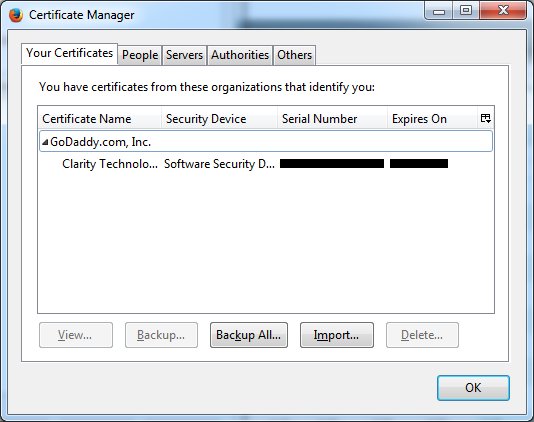
From there I located the certificate (pictured above), clicked "Backup..." which let me save it in PKCS#12 format, as a P12 file. Apparently this is also called the PFX format.
In the GoDaddy installation instructions, I had been trying to use their "Approach #1" to install the certificate, when I originally downloaded the PEM file. As far as I can tell, this approach is a wild-goose chase. I would move the PEM file into my Java directory, open up a command prompt in the same folder, and then try this command:
| Informational Only - Ignore This Part |
|---|
| > keytool -import -trustcacerts -keystore NewKeystoreFile.jks -storepass myPassWord -alias MyAlias -file cert.pem |
That would generate a file called NewKeystoreFile.jks in that same directory. Then I would go into NetBeans (which I used to build my applet), select Project Properties, go to Application > Web Start > Signing > Customize, and plug in that file:

But when I did a Clean & Build, my applet would not compile, and I would receive the following error:
jarsigner: Certificate chain not found for MyAlias. MyAlias must reference a valid KeyStore key entry containing a private key and corresponding public key certificate chain.
Apparently the PEM file (PKCS#7 format) doesn't cut it. It installs the certificate, but not the private key, into the keystore. I don't know what that means, but what it means is that it's broken and my applet won't work. So instead, I had to use the aforementioned P12 file I got from Firefox. There are no instructions on how to do this in GoDaddy's documentation. I was fortunate enough to discover a set of instructions provided in a blog post by someone from a company called JAMF Software. I don't know who they are but that blog post was a godsend.
So I copied my cert.p12 file into my Java directory, opened up a command prompt in the same folder, and used this command:
> keytool -v -list -storetype pkcs12 -keystore cert.p12
That command doesn't actually do anything, other than print out lots of information about the cert.p12 file on the screen. The only purpose of running that command is to find out what alias name GoDaddy decided to use in their certificate. In my case, because I work for Clarity Technology Group, GoDaddy used the following obnoxiously long alias name:
clarity technology group, inc.'s godaddy.com, inc. id
Whatever your alias happens to be, you need it for the very next step, which is why you run that first command to determine what it is. And if it's got spaces and apostrophes, etc. like mine did, you'll need to encapsulate it in double quotes. The next command, which is the crux of this whole process, is this:
> keytool -importkeystore -srckeystore cert.p12 -srcstoretype pkcs12 -srcalias "clarity technology group, inc.'s godaddy.com inc. id" -destkeystore NewKeystoreFile.jks -deststoretype jks -deststorepass myPassWord -destalias MyAlias
That generates a file in that same directory called NewKeystoreFile.jks, which you can then move out to some other directory and plug into NetBeans as shown above. And then it should actually work! I was able to do a Clean & Build without any error messages. And now, when I load up my applet, the popup message looks like this:
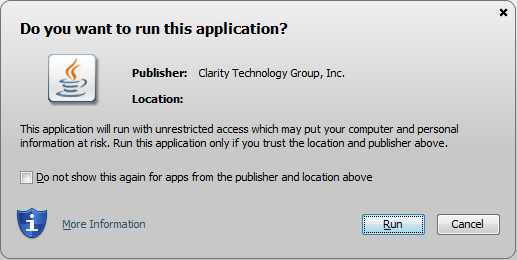
I'm going to write a later blog post about how annoying Java is. I am annoyed. Stay tuned.
Lifting others out of scandal
My last two posts have been part of a series on Biblical Models for Handling Controversy. I broke it down into four categories in a sort of "Punnett Square" style. A controversy can either be about you, or someone else. The one accused can be accused legitimately or falsely (see diagram). Then I examined the first two cases by providing Biblical ideas, reinforced with quotations from Mary Baker Eddy.
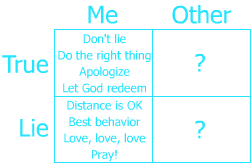
If you were looking forward to reading four posts in this series, I apologize, as this is the final post. That's because when someone else is at the heart of a scandal, the Biblical advice is the same whether they're guilty or not! More on that in a moment.
The first lesson on what to do when controversy has arisen which you are a witness to, but not the cause of, is to slow down and withhold judgment. Don't lash out with knee-jerk reactionary comments; first make sure you've got all the facts. And always consider that you could be the one who's mistaken. This is said succinctly by the writer of Proverbs: "Fools vent their anger, but the wise quietly hold it back."
Suppose you have been patient, careful, and the evidence clearly shows the offending party was wrong. Then what? Now you get to condemn them, right? No. Even if someone is legitimately in the wrong, the Bible recommends to try and redeem the situation rather than condemning it. Here's a story to illustrate.
Once upon a time, a woman cheated on her husband, was caught while doing it, and was dragged out into the town square in front of a man named Jesus. The men who dragged her out there had their own ulterior motives for doing so -- they wanted to show everyone that Jesus wasn't as good of a church leader as they were -- so they angrily asked what should be done with the woman. Keep in mind, at the time adultery meant you could be stoned to death.
Jesus' first response was to not respond at all. He ignored the men and played tic-tac-toe. But more than just pretending he didn't hear them, I think he was using that time to pray and listen for God's direction, rather than be swept up in emotion. He finally responded by forcing the men to examine their own behavior rather than the woman's. He said, "Let the one among you who has never sinned throw the first stone at her." One by one they all left. And he didn't throw a stone, either.
He told her, "I do not condemn you. Now go and sin no more." This meant that he didn't let her off the hook for the bad behavior; he was quite clear that what she had done needed to stop. But he separated the behavior from who she was, and focused on redeeming the person more than condemning the misdeed. Interestingly, he couldn't stop the controversy from happening in the first place, and to some extent he let her feel the sting of her own actions. But he also didn't let things stay there. He showed that Christ comes to lift us up, not to drag us down with drama and criticism.
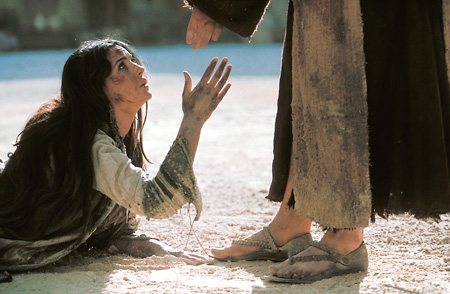
In that case, the cause for controversy was legitimate. Other times, it's not. The fact that you don't know is all the more reason to remain calm and don't take things personally. Even when an issue seem deeply personal, don't make a big drama out of it. It's still better to walk away from the situation for a while, than to lash out emotionally.
Consider the story of Joseph, husband of Mary. His fiancée told him she was pregnant, but he knew well they hadn't slept together. I see him as a man who had been trying his best to do things the right way. They were waiting until marriage, and keeping God at the center of their relationship. So I can only imagine the shock and disappointment he would've felt upon learning that his wife-to-be was carrying someone's child.
Did he yell and scream at her? Or turn violent? Or drag her out into the town square for judgment? No, instead: "Joseph, being a just man, and not willing to make her a public example, was minded to put her away privily." Or as another translation puts it: "he decided to break his engagement quietly." He didn't respond by immediately telling all his Facebook friends how awful Mary had been to him, or spouting off vitriol. He kept calm, kept it in, and quietly went to God with the problem.
This is such a powerful lesson, when you think about it. I stand in awe of Joseph's quiet strength. Eddy puts it this way: "We must love our enemies in all the manifestations wherein and whereby we love our friends; must even try not to expose their faults, but to do them good whenever opportunity occurs." Joseph refused to expose what seemed like huge, hurtful faults on Mary's part. And this mindset made him receptive to the miraculous revelation of the truth. He heard an angel message from God reassuring him that her child was conceived of the Holy Ghost. Something bigger was going on.
Whether a person is guilty of an offense or not, the way we treat them should be virtually the same. Look for ways to redeem the situation, put a stop to emotional and sensational reactions, and always have compassion.
But that does leave one lingering question: what if something bad is still going on, but it's not clear (or provable) who or what is causing it? Then, remember Jesus' promise: "there is nothing covered, that shall not be revealed; neither hid, that shall not be known." Bad behavior always tries to cover itself up, but the Bible promises that eventually it fails at doing so. So as you pray for direction, trust that whatever needs to come out, will. In the meantime, our role is not be the referee of others' lives. The best role we can hope to fill is to be like Christ, looking for ways to uplift and transform the situation rather than getting sucked into the downward pull of criticism and reaction.
I hope you enjoyed this series. I'd love to hear your thoughts in the comments section.
When you stand accused
This post is a continuation in my series on Biblical Models for Handling Controversy. In my last post, I broke down controversies into four distinct categories, and then went into detail on the first scenario -- namely, when you've done something wrong yourself. I included lessons from the Bible and correlative ideas from 19th century Christian pastor, Mary Baker Eddy. In this post I'll be covering the next scenario: when you've been accused of wrongdoing... that you haven't actually done.
If someone's ever said hurtful things about you, or accused you of something you didn't do, you can end up feeling pretty hurt yourself. And the accuser might be oblivious, or just insensitive, to how much trouble they've caused you. Often, people will see what they want to see, which means if they are determined to see the worst in you, they will. They'll either find a reason to hate you, or make one up. If you've ever been on the receiving end of that negativity, you might want to run away and hide in a cave. But before you do, you'll want to know what practical advice the Bible has to offer.

And actually... running away can sometimes be a good choice! It depends on the circumstance, of course, but in some cases the wisest course of action may be to maintain a healthy amount of distance. This is exactly what King David did in the Bible.
David didn't do anything wrong during his time serving under King Saul, but his accomplishments quickly became a source of jealousy for the king. Eddy touched on this when she wrote: "Your advancing course may provoke envy, but it will also attract respect." It was Saul's insecurity and weakness that brought on the false accusations. He even tried to kill David by throwing a javelin at him. But do you know how David responded? Not by throwing a javelin back, but rather: "David avoided out of his presence twice." In other words, he kept a healthy amount of distance from a tough situation.
But that's not always possible. Sometimes you have no choice but to continue interaction with someone who has it out for you. So what then? Be on your best behavior. Earlier I wrote about the importance of doing the right thing after you've made a mistake. It may actually be more important to do the right thing when you haven't made any mistakes -- but when you've got green eyes watching your every move. The Bible touches on this too; it says, "David behaved himself wisely in all his ways, and the Lord was with him."
"But that's not fair," you might say, "I'm innocent!" These sorts of situations are tools that help us grow. The writer of Proverbs says, "as iron sharpens iron, so one person sharpens another." Wouldn't you agree that these things force you to stay sharp? That's not a bad thing; it's an opportunity to grow. It can ultimately draw out the very best in you. Eddy has this to say: "Whatever purifies, sanctifies, and consecrates human life, is not an enemy, however much we suffer in the process."
Most important of all, though, is to remember that hatred won't get you anywhere. If someone has decided to hate you, whether unwittingly or intentionally, you cannot respond in kind. You have to rise higher, find some way to honest-to-goodness love them, and trust God to work out the details. Kill 'em with kindness, as they say. Remember that your accuser isn't the one who gets to make a final judgment call, even if they're in a position of authority. Real authority only ever comes from God, and Love always gets the last word.
When Daniel was thrown into a den of lions for violating a trumped-up charge, he didn't confront his accusers. He didn't harbor any hatred toward them at all. Joseph's story is even more inspiring. His brothers left him for dead, he was falsely accused of rape, and was imprisoned for years. He had every right to be angry. But instead, he met his accusers with tears of joy in his eyes. And with magnanimous forgiveness, he said, "You intended to harm me, but God intended it all for good."
Please don't think I'm saying that you should gloss over false accusations. After all, one of the commandments is "Thou shalt not bear false witness against thy neighbor." You want the truth to come out; you want redemption. It will happen. (Maybe not with fanfare, but it will.)
I'm also not implying there's an easy way to skip directly to "Go" and collect $200. The Bible doesn't promise any shortcuts. Part of the growing experience can be learning to stand up for yourself -- but always in a way that doesn't make it personal. This may involve speaking boldly, or it may involve remaining silent. The only way to know for sure, in your situation, is to pray. Ask God what to do. And then trust His answer. There is a light at the end of the tunnel. I'll close this post with a few Biblical promises that are heartening.
"Humble yourself under God's mighty hand, that He may lift you up in due time." (Peter)
"No weapon turned against you will succeed. You will silence every voice raised up to accuse you." (Isaiah)
"You will not need to fight in this battle. Stand firm, hold your position, and see the salvation of the Lord on your behalf." (Chronicles)
"I won't be afraid of thousands of people surrounding me on all sides. Rescue comes from the Lord!" (David)
"The Lord says, 'I will give you back what you lost.'" (Joel)
Biblical Models for Handling Controversy
Controversy is a lot like a young child, or a cat: it seems to find its way into everything. Wherever you go, whatever you do, whether that's in business, in organizations, in families, or even in churches, some sort of scandal arises sooner or later with differing sides and people pointing fingers. Sometimes scandals can be public, other times they can consist of gossip and be more passive aggressive or hidden. Thankfully, whatever the situation may be, the Bible is chock full of proverbs, firsthand accounts, and allegories that teach us valuable lessons on how to handle controversy when it arises.
The next few blogs I'll be writing are going to be a series on how to handle controversy, within and without. I'll be sharing what the Bible teaches, as well as including some quotes from 19th century pastor and teacher Mary Baker Eddy. In thinking about this topic, I realized that you can break down controversies into four categories using a "Punnett square" of scenarios. At the heart of every scandal, there's always someone who stands accused of wrongdoing. That person is either you, or someone who is not you. That's one axis of our Punnett square. And with every accusation of wrongdoing, that accusation is either well-founded, or malicious. It's either true, or false. So here goes... starting off with controversy aimed at you, when you really did do something wrong.

We all make mistakes. At one point or another, it's rather inevitable that you'll do something wrong. So what do you do if you've slipped up? Do you condemn yourself to hell and throw in the towel? Or do you hide your error and hope that no one notices? Both of those responses are actually quite common. I know I've attempted both myself at different points! But as you've already guessed, neither response has any Biblical basis, nor do they ever prove to be remotely helpful. So what then?
First of all, don't lie. Don't ever lie. The writer of Proverbs tells us: "People who conceal their sins will not prosper, but if they confess and turn from them, they will receive mercy." I believe that God is Truth itself, and since each one of us is created in the image and likeness of God, in the image and likeness of Truth, it is in our nature to be truthful and honest. It goes against our nature to lie. Mary Baker Eddy put it this way: "Honesty is spiritual power. Dishonesty is human weakness, which forfeits divine help."
Secondly, do the right thing! If you've done something wrong, you won't ever improve your situation by just continuing in it. Make a U-turn and start doing the right thing, and do it right away! Jesus has a wonderful lesson about this in what's called the Parable of the Two Sons. He tells a group of church authority figures a story about a man with two sons. The man owns the family business -- a vineyard -- and tells both his sons to go out and work. The first one impudently says, "no way!" while the second one says, "sure thing, dad!" But both of them are liars. The first one changes his mind and does go to work after all. The second one, who said he would... doesn't. Jesus brings home the point when he asks which one truly obeyed his father. And even though the road to get there was a little messy, it's clear that the first son was in the right. Eddy puts it this way: "If you believe in and practise wrong knowingly, you can at once change your course and do right."
Thirdly, apologize where needed. But in so doing, you don't have to turn guilt into a false idol. Sometimes there can be a tendency to just gush when admitting to wrongdoing. I remember the first time I ever received a speeding ticket -- only nine days after being awarded my driver's license. I drove home immediately, crying, and handed the car keys to my mom telling her I was the worst driver ever. She just thought the whole thing was terribly funny -- mostly because of my own overreaction. And she was right! Humor can be a wonderful antidote to defuse the hurt feelings that come with admitting to wrongdoing. But unfortunately, not everyone receives apologies so gracefully. So if you've done something wrong, correct it, learn from it, apologize where needed (even if you don't want to!), but move on. Don't carry your guilt around forever. You don't have to constantly keep going back over the offense like a broken record.
Sometimes people will forgive you, and sometimes they won't. But how anyone else reacts, long term, is not your responsibility. The issue is always between you and God alone. But on this topic, the story of Ananias and Paul is so heartening. Paul, previously named Saul, had been a killer of Christians. You could say he was doing the wrong thing! But when he finally realized it, he had a profound 180° turnaround. Ananias, himself a Christian disciple, had heard of Saul and wanted nothing to do with him. But he was called by God not only to forgive Paul, but also to heal him. And so he did. That same healing principle is just as true today -- people that you've hurt and people that don't like you still have an open door to see what God sees in you. God can speak to them as He did with Ananias.
Oh, and last but not least, pray! God is listening and will help you. It is "His good pleasure to give you the kingdom." That "kingdom of heaven" being referred to isn't a far off promise or some cosmological locale; the very act of doing right, right now, is its own reward. That is heaven. And there are so many stories about how God, more than in other situations, helps people who are trying to turn around from a difficult or scandalous circumstance. You can't control how other people will react. But you can control your own actions and then trust God for the resolution. It may not be a flashy news story proclaiming your greatness and glory, but you can trust it will be good. And as you'll see in my next post, that can pay off!
Reindeers are better than people
After seeing Disney's Frozen last week, I can't stop singing all of the songs from the soundtrack. So I decided to learn one of them on guitar and do a quick cover song! Enjoy.
I also figured out how to do simultaneous multitrack recording on my Mac, and so this is the first song I've recorded utilizing multitrack recording. And I have to say: multitrack recording is amazing! I don't know how I ever lived without it! Now I just need to figure out how to get my video editing software to actually retain the HD quality that my camera records in.
A Revolution in Consciousness
I'm a big fan of NBC's hit drama Revolution. (Warning: spoilers ahead.) Admittedly though, I've been less satisfied with the second season so far, but nevertheless have remained a faithful follower of the show. One of the things that I've felt has detracted from the storyline has been the writers' obvious penchant for a purely materialistic view of life, the universe, and everything... which has permeated the story lately.
In the first season, the big reveal was finding out that the source of the show's mysterious blackout was in quadrillions of tiny little robots floating ubiquitously in the air. The second season revelation is that these nanomachines have become intelligent and self-aware. One character points out that the human brain is little more than electrical signals bouncing around in a network, and that this machine was functioning in an identical way. And because of its sheer scope, for all intents and purposes, the machine had become God.
The ideas are cleverly presented, though intellectually rather stale. Nevertheless, they raise some important and fun questions:
- Are you and I electrical signals bouncing around in a network of neurons?
- Is consciousness determined and defined by brain matter? (or robots?)
- Can we expect to find God manifested in some material form?
Recently I discovered a fascinating interview which sheds some light on these questions and more. The folks from the Christian Science Journal had a chance to speak with Dr. Eben Alexander regarding his recent book, Proof of Heaven: A Neurosurgeon's Journey into the Afterlife. The Journal interview does a good job of culling many of the important points, and can be read online at this link.
As Dr. Alexander's subtitle suggests, he was a neurosurgeon -- and a rather prestigous one I gather, as his résumé includes 25 years of practice at well-known hospitals like Harvard Medical School, Brigham & Women's, and more. And for all of his career he was a self-described skeptic with perhaps even more of a dismissively materialistic view of the universe than the NBC writers. That changed after the big event described in his book, and as you can see based off what he has to say now:
"The pure, scientific, materialist model that I worshipped for so many years has absolutely nothing to offer up in terms of explaining how consciousness might emerge from the physical brain. [...] Pure materialism does not explain the nature of existence in reality. [...] It's time for brain science, mind science, physics, cosmology, to move from kindergarten up into first grade and realize we will never truly understand consciousness with that simplistic materialist mindset."
The interview highlights the event that inspired his book. Briefly, he contracted a rare form of meningitis which, over time, totally destroyed his neocortex and left him brain dead. He was in a coma for a week with literally zero brain activity. There was nothing left to have activity! Prior to this, he had written off anyone claiming "near death experiences" as delusional, most likely having hallucinated their "journeys" due to random synapses firing. But in his own experience, he had no brain activity. His neocortex was physically gone. Yet, as he explains, through it all his consciousness continued uninterrupted.
He discovered that life and consciousness is ultimately "all one, and divine at the core." He felt a reassurance telling him, "you are loved; you can't do anything wrong; you have nothing to fear." Jumping in with my own thoughts... I think those three messages echo well what's written in 1 John 4:19, Romans 8:38-39, and Isaiah 41:10, respectively.
It's a fascinating interview in so many ways, and gives us glimpses at the real nature of consciousness and reality. (Read it yourself!) So while I do continue to watch "Revolution" on NBC for the entertainment value, the real "revolution" going on is this realization that matter doesn't determine consciousness; it's the other way around!




